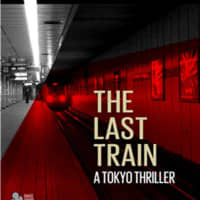An extremely inebriated American, employed by an international real estate developer, falls to his death from the platform of Tamachi Station. He was last seen in the company of an attractive Japanese female. Was it an accident, suicide or murder?
The Last Train: A Tokyo Mystery, by Michael Pronko.
348 pages
RAKED GRAVEL PRESS, Fiction.
In the police procedural that follows, a pattern emerges involving a sinister nexus of gangsters, real estate developers and femme fatales at glitzy Roppongi watering holes. The tale may have been partly inspired by the spiking of customers' drinks at Roppongi clubs — at one time common enough to prompt the U.S. Embassy to issue citizens an advisory warning against drinking there.
Into the fray steps detective Hiroshi Shimizu, the Metropolitan Police Department's (MPD) in-house English and financial savant. While honest and tenacious, Shimizu is clearly unsuited for police work; his emotional soft spot for the downtrodden seldom gets reciprocated and his self-defense techniques fall painfully short of the demands of the job.
One of the worst pitfalls of fiction set in Japan is stereotyping of characters. That is not a problem in "The Last Train," but flashes of originality and well-crafted prose aside, Pronko's otherwise entertaining work is diminished by some easily avoidable errors. The MPD does not have a Homicide division: Serious crimes are usually dealt with by section one of the Criminal Investigation Division. The Yushima Tenjin, a Shinto shrine, would not have been a venue for funerals. And a Shinto shrine would employ priests, not monks, who belong to Buddhism. Such mistakes are irksome, to this reviewer at least.


















With your current subscription plan you can comment on stories. However, before writing your first comment, please create a display name in the Profile section of your subscriber account page.